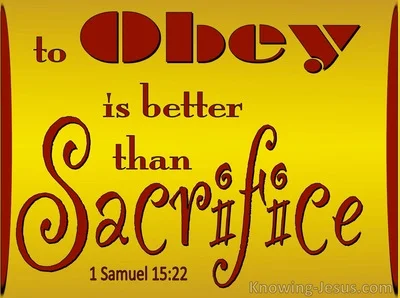You may have experienced a situation in which you started out well, but then you grew complacent only to discover that you’ve lost focus and have gotten off track. It’s important to have a good start, but it’s more important to finish well. A careful study of leaders in the Old Testament reveals that few leaders finished well. Israel’s first king is a classic example. Saul was a handsome man who was head and shoulders above any of the other people (1 Samuel 9:2).
Samuel was tasked with anointing Saul to be the king (1 Samuel 9:17). Saul’s first challenge came when the Ammonites threatened the inhabitants of Jabesh-gilead. Saul took decisive action and rescued the people. Any doubts about Saul’s qualifications were quickly dispelled as Saul took the high road and gave the glory to the Lord:
Then the people said to Samuel, “Who is he that said, ‘Shall Saul reign over us?’ Bring the men, that we may put them to death.” But Saul said, “Not a man shall be put to death this day, for today the LORD has accomplished deliverance in Israel.” (1 Samuel 11:12-13)
Saul had a good start, but he started thinking that he knew better than God. Pride can be insidious and Saul assumed the priestly office:
Samuel said to Saul, “You have acted foolishly; you have not kept the commandment of the LORD your God, which He commanded you, for now the LORD would have established your kingdom over Israel forever. “But now your kingdom shall not endure. The LORD has sought out for Himself a man after His own heart, and the LORD has appointed him as ruler over His people, because you have not kept what the LORD commanded you.” (1 Samuel 13:13-14)
Rather than having a heart after God, Saul clung to his power as king. The situation went from bad to worse as Saul failed to carry out God’s command to utterly destroy the Amalekites. Saul thought he knew better and rather than taking responsibility for his failure, he blamed the people:
But the people took some of the spoil, sheep and oxen, the choicest of the things devoted to destruction, to sacrifice to the LORD your God at Gilgal. (1 Samuel 15:21)
Saul was no longer serving God but himself. He viewed the sacrifice for Samuel’s God, but not his God. Samuel then pointed out what faithfulness to God entails:
Samuel said, “Has the LORD as much delight in burnt offerings and sacrifices as in obeying the voice of the LORD? Behold, to obey is better than sacrifice, and to heed than the fat of rams. For rebellion is as the sin of divination, and insubordination is as iniquity and idolatry. Because you have rejected the word of the LORD, He has also rejected you from being king.” (1 Samuel 15:22-23)
Saul ignominiously died in battle, a defeated and bitter man who started well, but finished poorly because he rejected God’s word.

Associate Pastor – Discipleship. The Church at LifePark
Professor of Discipleship, Columbia International University
Follow me on twitter: rickhiggins5

Leave a Reply